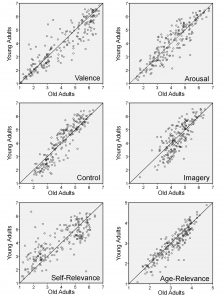AGE
The Age-Dependent Evaluations of German Adjectives (AGE) are evaluations for 200 German adjectives by young and older adults. Adjectives were carefully selected for the use in experimental settings (e.g. memory experiments).
 Ratings include a broad spectrum of information from different sources. The norms include (a) objective characteristics (word length and frequency), (b) subjective ratings of valence, arousal, control, imagery, self-relevance, and age-relevance by young and older adults, (c) subjective ratings of valence, arousal, young-relevance, old-relevance, and self-relevance by young and older adults for a subset of 90 words, and (d) subjective ratings of self-other relevance by psychology students.
Ratings include a broad spectrum of information from different sources. The norms include (a) objective characteristics (word length and frequency), (b) subjective ratings of valence, arousal, control, imagery, self-relevance, and age-relevance by young and older adults, (c) subjective ratings of valence, arousal, young-relevance, old-relevance, and self-relevance by young and older adults for a subset of 90 words, and (d) subjective ratings of self-other relevance by psychology students.
Analyses revealed that young and older German adults differ tremendously in their perception of emotional adjectives. Approximately 50% of all adjectives showed age-related differences in their evaluations. In sum, the message of the AGE ratings is that one can not simply assume that older adults use and perceive emotional adjectives similarly to young adults. For example, “sad” might not be as negative for older adults as it is for young adults.
Ratings are available here with a corresponding readme file.
When citing the corresponding article, the appropriate citation is: